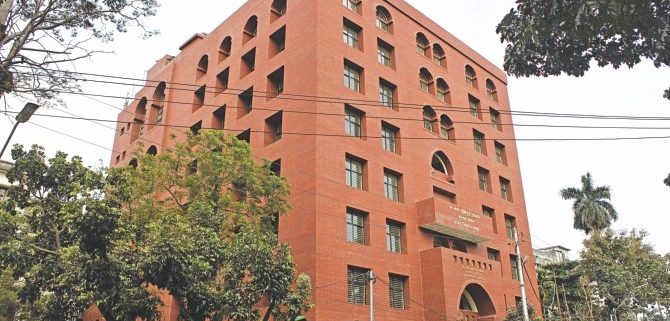Love for maths stands tall
12:00 AM, December 06, 2014 / LAST MODIFIED: 01:53 AM, March 08, 2015
Love for maths stands tall
Son of maths genius helps build 8-storey building at DU for students to excel in science
https://dev.thedailystar.net/love-for-maths-stands-tall-53599
Wasim Bin Habib

The AF Mujibur Rahman Mathematics Building on Dhaka University campus. Equipped with advanced amenities for maths studies, this Tk 27-crore facility is built with funding from AF Mujibur Rahman Foundation. Photo: Star
For philanthropic causes, some people donate a hefty amount of money to a charity or help out a disadvantaged community. Others like to set up facilities for orphans or provide indigent students with tuition scholarships.
But the AF Mujibur Rahman Foundation, a charitable trust, has done an awe-inspiring job of building an eight-storey modern academic building for about 850 students of pure and applied mathematics of Dhaka University when many of its departments are facing shortage of classrooms.
The AF Mujibur Rahman Ganit Bhaban is next to the Science Annex Building of DU. It is all set to open its doors to teachers and students today.
The building has 15 classrooms, each fitted with multimedia equipment. There are also five computer labs, two libraries and a room each for seminar, hall, and teachers’ conference.
Prof Dr Amulya Chandra Mandal, chairman of mathematics department, said the students will be greatly benefited from the new building.
Rezaur Rahman, founding partner of Rahman Rahman Huq, a leading chartered accountancy firm in Dhaka, had set up the AF Mujibur Rahman Foundation in 1985. The organisation supports a wide range of charitable activities. It has been awarding gold medals to DU students for their excellence in maths for the last 17 years.
It also gave away prizes to the students of mathematics department at Chittagong, Khulna and Rajshahi universities in the last few years. The charity also collaborates with Bangladesh Mathematical Society in sponsoring the National Undergraduate Maths Olympiad.
The charity will hold the 18th gold medal awards ceremony today.
THE EARLY DAYS
The story behind the ganit bhaban dates back to 2007 when Rezaur Rahman, chairman of the foundation and elder son of late AF Mujibur Rahman, was moved by a newspaper report that exposed the lack of infrastructure hampering academic activities at the country’s premier public university.
“Seeing the news, he [Rezaur] decided to do something. He met the then vice chancellor of the university with the proposal of building the structure. And things then got rolling,” said Sayyada R Ghuznavi, acting chairman of the foundation and sister of Rezaur Rahman.
It was Rezaur’s forward-looking vision which has made the initiative a reality, she told The Daily Star. He has donated all his properties to the charity which has already spent Tk 20 crore for the ganit bhaban.
The reason for picking the mathematics department was Rezaur’s late father Abul Faiz Mujibur Rahman.
Born in Gedra of Faridpur, Mujibur was placed first in First Class in his masters exams in pure mathematics at Kolkata University in 1920. He had improved the previous record marks obtained by Sir Ashutosh Mukherjee, then VC of the university.
Mujibur then joined the Indian Civil Service (ICS) following recommendations from Sir Ashutosh to the ICS selection board.
Sayyada said his brother, now in the UK, planned to get his colleagues and friends involved in charitable activities to improve facilities at other DU departments.
“I think this initiative will inspire other people, particularly the alumni of Dhaka University. Many organisations may also be encouraged to contribute to the university,” she added.
Everybody, said the acting chief of the foundation, does not necessarily need to build an eight-storey building. Even supporting an individual could be of big help to a hard-up student.
“We don’t like to take individual initiatives thinking that the problem is so grave and therefore, the move would not bring much benefit,” she observed.
The troubles, of course, are intimidating, but if we all can do a little at personal level, 25 percent of the problems would be solved, said Sayyada.

